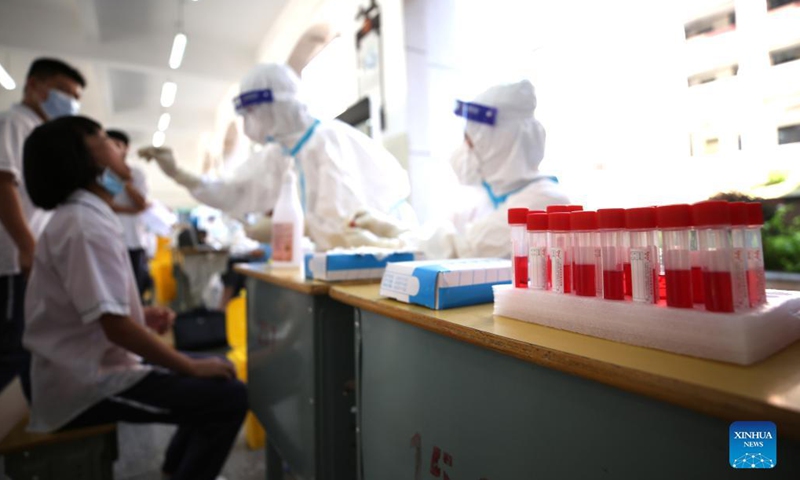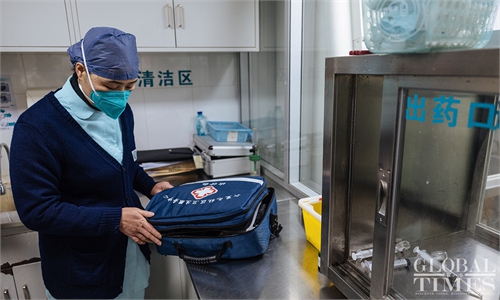Mass COVID testing no longer required in universities, schools with no cases to resume in-person classes: Ministry of Education

A medical worker collects a swab sample from a student for nucleic acid testing at No. 9 middle school in Longyan, southeast China's Fujian Province, Sept. 15, 2021. Recently, a new round of nucleic acid testing has been launched for all teachers, students and staff in schools in Fujian province due to the latest COVID-19 resurgence. (Photo: Xinhua)
Universities and colleges across the country will no longer carry out mass COVID-19 nucleic acid testing and schools with no cases will resume in-person classes and activities, China's Ministry of Education (MOE) announced on Friday. This is the latest step in China's adjustment and optimization of epidemic prevention measures.
In the newly released guidelines for COVID-19 prevention and control in schools made public on the MOE's official site, the ministry pointed out the new guidelines aim at striking a balance between epidemic control, education and people's safety, in accordance to the country's decision of downgrading the management of COVID-19 from Class A to Class B from January 8, 2023.
With nine areas of focus, the new guidelines include the optimization of on campus COVID-19 testing, teaching, prevention and control by monitoring the health of teachers and students and guaranteeing the presence of sufficient school medical supplies.
According to the new guidelines, higher education institutions will no longer need to conduct mass nucleic acid testing for all staff and students. Instead, nucleic acid or antigen testing for key staff will only be conducted according to specific regulations.
University professors and students are then no longer required to provide negative nucleic acid certificates for entering the school and public areas of the campus, except for cross-regional enrollment. Teachers and students in primary and secondary schools and kindergartens no longer need to provide nucleic acid certificates for entry either.
Additionally, schools with no infections will resume in-person classes and on-campus activities. When there are infections surging, primary, secondary schools and kindergartens need to adopt strict closed management, while higher education institutions can implement different zone management and begin online classes.
Schools are also required to enhance their capacity to counter the epidemic and to protect their students. Higher education institutions need to prepare a sufficient number of beds and medical staff in line with the teacher and student population.
Schools are also required to store relevant traditional Chinese medicine, COVID-19 drugs and antigen testing kits for about 15 to 20 percent of the total population on campus, and to stock up epidemic prevention supplies such as masks, disinfectants and thermometers that should suffice for over one week.
Local health authorities will support universities in building health stations on campus, assigning medical staff and providing independent accommodation, temporary health monitoring and treatment for asymptomatic cases and patients with mild symptoms. Local health authorities are also required to set up a stable docking mechanism between schools and hospitals.
In terms of prevention, the guidelines require schools to disinfect public areas, to maintain air circulation in teaching areas, dormitories, public toilets and other places and to minimize the use of indoor enclosed spaces lacking natural ventilation.
Disinfection supplies shall be placed at building and elevator entrances. Schools are encouraged to help students keep a safe distance from each other by reducing class sizes and increasing the spacing between desks.

